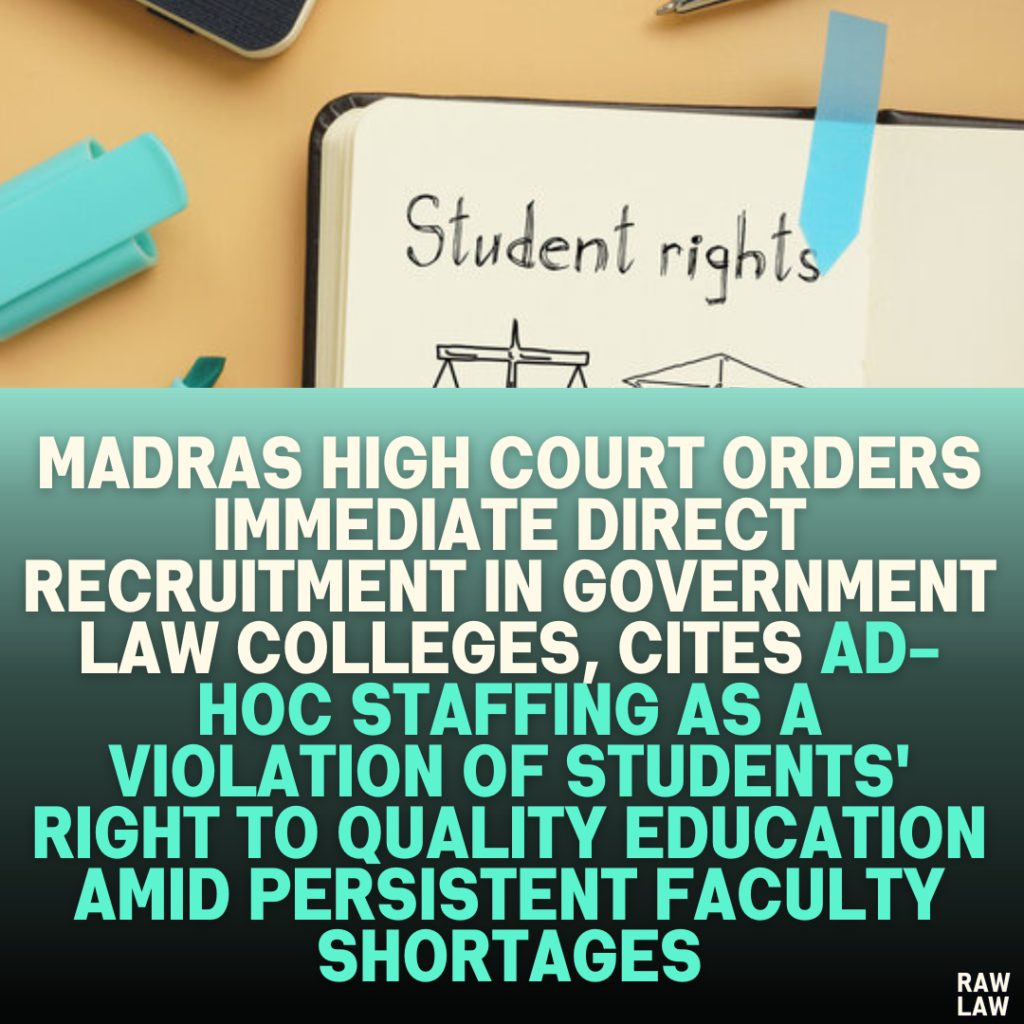Court’s Decision: The Madras High Court quashed the proceedings dated October 16, 2017, issued by the Government of Tamil Nadu, which opted to upgrade existing Assistant Professors rather than directly recruit for vacant Associate Professor posts in Government Law Colleges. The court mandated the completion of recruitment for Associate Professors and Assistant Professors, supervised by an Expert Committee, to fulfill sanctioned positions and improve legal education quality.
Facts of the Case: The petitioner, an Assistant Professor, sought recruitment to fill vacancies for Associate Professors in Tamil Nadu Government Law Colleges, arguing that vacant posts were not filled via direct recruitment, thereby affecting qualified individuals’ opportunities. The Government responded that Associate Professors’ vacancies would be filled through internal promotions rather than direct recruitment. This decision led the petitioner to file a writ, seeking direct recruitment compliance.
Issues:
- Whether the government’s decision to upgrade Assistant Professors in place of direct recruitment violated existing recruitment rules.
- Whether the prolonged vacancy of sanctioned teaching posts affects the quality of education provided in Government Law Colleges.
Petitioner’s Arguments: The petitioner argued that vacant positions, specifically for Associate Professors, were not filled according to prescribed norms. The petitioner maintained that the lack of direct recruitment harmed qualified candidates’ prospects and compromised educational standards in Government Law Colleges due to faculty shortages.
Respondent’s Arguments: The respondents contended that they had taken appropriate steps to address faculty vacancies, relying on upgrades and promotional policies. The government indicated that recruitment guidelines allowed promotions as a solution and assured the court of ongoing efforts to fill vacancies.
Analysis of the Law: The court examined the Special Rules for Tamil Nadu Legal Educational Service, which mandates filling 40% of Associate Professor positions through direct recruitment. The court noted that promoting from within without considering direct recruitment violates these statutory provisions and deprives qualified individuals of employment opportunities.
Precedent Analysis: The court referenced decisions emphasizing the right to education, particularly Unnikrishnan’s Case (1993), where the Supreme Court declared that the right to education includes quality education as part of the fundamental right to life. Additionally, the S. Ramesh vs. Bharathidasan University case underscored the importance of qualified faculty for quality education.
Court’s Reasoning: The court determined that the respondents’ decision not to fill sanctioned posts through direct recruitment contravened statutory recruitment mandates and negatively impacted the quality of education in government institutions. The court emphasized that reliance on temporary or ad-hoc faculty compromises educational standards and violates students’ rights to quality education.
Conclusion: The High Court ordered the government to immediately initiate a transparent recruitment process for Associate Professors and Assistant Professors through direct recruitment. It constituted an Expert Committee chaired by Justice V. Bharathidasan to oversee the process and ensure compliance with reservation rules and UGC norms. The Committee will report progress to the court in December 2024.
Implications: This judgment reaffirms that governments must adhere to recruitment laws for faculty positions in educational institutions. The decision emphasizes the state’s responsibility to ensure a qualified, permanent teaching faculty in public institutions, underscoring that failing to meet these standards undermines educational quality and students’ futures, particularly those from underprivileged backgrounds relying on government colleges for affordable education. The decision could prompt similar directives for timely recruitment across other educational sectors facing faculty shortages.




The post was very good, I appreciate how you explain it, Keep the posts coming! Very good talent.
Pingback: "Delhi High Court Modifies Conviction in Robbery Case to Section 394 IPC, Citing Misidentification of Stabber; Reduces Sentence to Five Years RI" - Raw Law